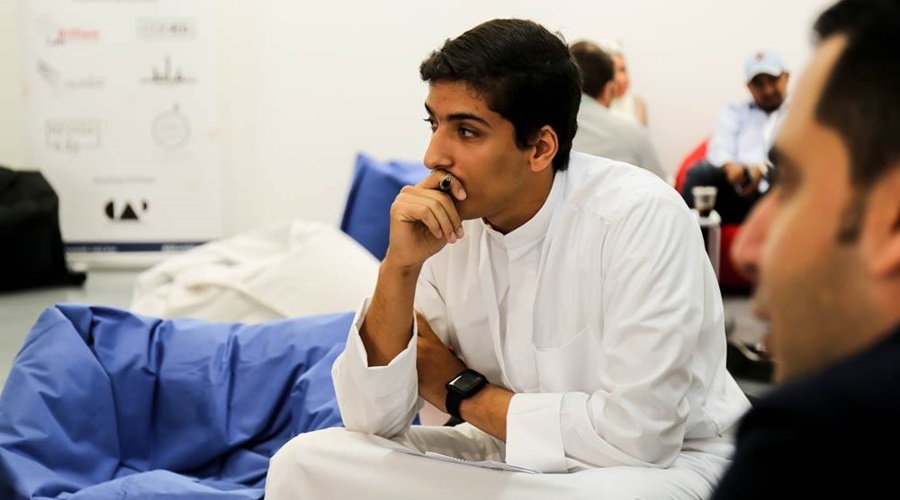Entrepreneurship in the Arab world: In English or in Arabic?

When Wissam Tawileh, a native Arabic speaker was pitching at the latest Jusoor competition, he was the only one who opted to pitch in English.
“Arabic tech terms are hard and outdated. However, English is a smoother language in this field, allowing you to communicate your idea to a bigger audience”, he told Wamda.
Some find that the Arabic language, which is our mother tongue, should be the language used in the regional entrepreneurial ecosystem. Others insist that entrepreneurs should put in more effort to learn English, the global business language.
Pitching competitions play a fundamental role in the life cycle of a startup. They are their ticket to acquiring funding, taking part in an incubation or acceleration program. While most events organize pitching competitions in English, language can become the first obstacle some Arab entrepreneurs face.

The first stop: pitching
At the Jusoor Entrepreneurship Competition held last April in Beirut, 12 teams pitched their ideas in Arabic and only one chose to do so in English. These numbers were not surprising; plenty of young Arabs, especially in country such as Syria and Egypt, often find it difficult to communicate in English.
This issue is not limited to the Arab region, Europe and the world also face it, said German pitch-coach, Bianca Praetorius. “In Europe, there are several conferences in local languages, but English has become a global entrepreneurship language that many entrepreneurs want to learn believing it’s their key to going global”.
Though she knows how to speak English, Lynn Daher pitched her Tabeeb app, which connects doctors to patients, in Arabic at the Jusoor competition. “It’s easier to speak Arabic. It’s our mother tongue and it’s also used in our education system. When you are explaining and pitching, you can use the terminology and keywords in English”.
Praetorious sees no problem in that. “It’s normal for one to be more comfortable talking in their own language,” she explained.
“Pitching competitions in Arabic are important to early stage startups because they help teams receive feedback and provide them with the necessary experience, in addition to teaching them how to pitch in general”, said Laith Zraikat, venture partner at Arzan VC.
Zreikat told Wamda he is willing to invest in a team that has a good idea, even if none of its members speak English. However, he strongly advises that they do. “We once wanted to invest in a promising company, but could not reach an agreement because we were dealing with the translator and not the founder.”
Not everyone can do it
Tawileh launched in Germany Nahi app specialized in translating food ingredients into Arabic. However, he insisted that pitching should be in English even if the product targets Arab customers.
This seems to be closer to what investors want. Zraikat described venture capitals as a new sector in the region using English as a first language. “There are a lot of foreigners in this sector as well,” he added. “In more advanced stages, startups require VCs, that is why the entrepreneur must learn English to well communicate with investors”.
For Ahmad Sufian Bayram, head of Jusoor and regional manager in the MENA for the global accelerator Techstars, English is important for companies that want to scale abroad, but this does not mean everyone must learn English before launching any idea or project.
He told Wamda that these events can use the local language of the targeted market and be a platform for entrepreneurs to learn English terms.
Practical solutions, but English is a must?

No matter the language you decide to go for, the entrepreneur must master his presentation and know how to answer questions without hesitation, said Praetorius. “Mastering the techniques of rhetoric in your own language makes commanding another language easier”, she added.
As for entrepreneurs who have companies and ideas but face problems speaking English, Zraikat advises looking for Arab investment companies or companies that have Arabic speaking decisionmakers.
If that is not possible, Praetorius suggests that these entrepreneurs pitch in Arabic and present explanatory images with English terms. She also said they can seek help from a team member or a friend to answer questions in English.
She also advises those who know a bit of English to speak Arabic but use English for technical terms, or to prepare an English text to address investors and then answer the questions in Arabic. This is similar to Daher’s pitching approach.
Praetorious sees that learning English is crucial if the entrepreneur wants to present his company to the world and get the investments he needs, because “investors will not invest in you if they do not understand what you offer and then trust you”.
Opportunities for investors also
So while it might be true that English is the investor’s favored language when pitching, this does not necessarily apply to the products the startups offer.
There are regional startups that have managed to expand in their markets because their products ‘speak’ the local language, such as Talabat in Kuwait, Haraj in Saudi Arabia and Careem in the UAE.
In addition to that, by 2018, internet users in the region are expected to reach around 226 million, which gives entrepreneurs big opportunities to launch Arabic content projects.
Zraikat said that some of the best startups in the region are those that have localized their product. With the biggest markets in the region like Saudi Arabia and Egypt preferring to do business in Arabic, VCs should have Arabic speakers in order to communicate with startups.
The more entrepreneurship grows in the Arab region, the gap between Arabic and English grows in business. It may be necessary for entrepreneurs to learn English, but “while young Arab entrepreneurs face several obstacles in the region, the last thing they need is the language burden, especially in early stages,” said Jusoor’s Bayram.
Feature image via Wamda.


